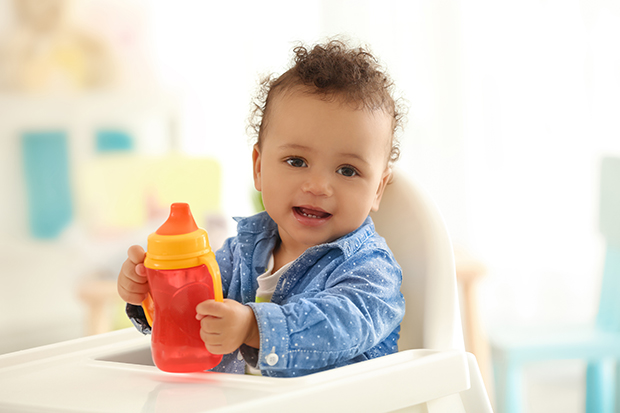
Submitted by Thomas Hall, D.M.D and Sara Rauen Dardis, D.D.S, Pediatric Smiles of Bloomington
What new parent isn’t thrilled with their baby’s first smile? While marveling over this new development, you probably aren’t thinking about your baby’s dental health, but you should be! A lifetime of healthy smiles begins at birth. Teeth actually begin forming even before birth, and are just under the gums, waiting to appear between six months and one year of age.
These baby teeth are very susceptible to cavities. In fact, nearly 50 percent of children will develop some form of tooth decay before the age of five. Decay occurs when sweetened liquids, including natural sugars in formula, milk, fruit juice, and even breast milk — are left on the teeth and gums. Natural or added sugars in the liquid are changed to acid by bacteria in the mouth. This acid then dissolves the outer part of the teeth, causing them to decay. If left unattended or untreated, the decay will cause pain and possibly infection. One of the best ways to prevent cavities starts with your child’s bottle.
Tooth decay in infants and very young children is often referred to as “baby bottle tooth decay” or “nursing caries.” This is more than just a little cavity in a baby tooth. Baby bottle tooth decay can destroy a child’s first teeth before they are even three years old! The most common way this happens is when parents put their children to bed with a bottle of formula, milk, juice (even when mixed with water), or other sugared drinks. It can also occur when children are allowed to frequently drink anything other than water from a sippy cup during the day or night. Milk should only be served with meals and not offered throughout the day, at nap time, or at bedtime. In addition, on-demand and nocturnal breastfeeding can increase the risk. The formula or milk just pools in the mouth, providing the ideal environment for the decay-causing bacteria to rapidly multiply.
While some people may think that baby teeth are not important — after all, they start falling out about six years of age with the last baby teeth being shed around age 12 — consider these facts about baby teeth:
- They are essential for chewing and processing food.
- They are crucial for proper speech development.
- They serve as placeholders for the adult teeth that are forming under the gum line.
- If baby teeth are healthy, permanent teeth are more likely to be healthy as well.
Luckily, tooth decay in young children is preventable, starting with some simple guidelines.
- Bottles should only contain water, milk or formula. Anything else — including juice — contains large amounts of sugar, which promotes decay.
- Never allow your child to fall asleep with a bottle. Avoid propping up a bottle while a baby is in their car seat or infant seat.
- Wipe baby’s gums with a clean gauze pad or damp washcloth after each feeding.
- Use a bottle only at mealtimes, not as a pacifier during the day or night.
- Develop a bedtime routine that doesn’t include a bottle or nursing as the final step.
- Encourage your child to drink from a sippy cup beginning at about six months. The American Dental Association recommends eliminating baby bottle use by their first birthday.
- Do not let toddlers walk around with a bottle in their mouth.
- Begin brushing with a soft toothbrush at the sight of the first tooth. Use a toothpaste with fluoride. Only use a “smear” or “grain of rice size” amount of toothpaste as infants and toddlers often ingest rather than spit out their toothpaste.
Your dentist is an essential partner in forming a lifetime of smiles. The American Dental Association and the American Academy of Pediatric Dentistry recommend that the first dental visit should occur within six months of the first tooth’s appearance, but no later than the child’s first birthday. Purposes of this first visit are to establish a dental home, create a comfortable dental health care environment, and teach parents how to properly care for their child’s teeth and oral health. Good dental habits, beginning at birth, provide the foundation for a lifetime of strong, healthy teeth and gums so your child’s smile will always be amazing!
Pediatric Smiles of Bloomington is a specialized dental office for children 0 to 18 and special needs patients. They are located at 1112 Trinity Ln. in Bloomington and may be reached at 309-663-7339. Ask about their “No-Cavity Club” and the rewards kids may earn.

